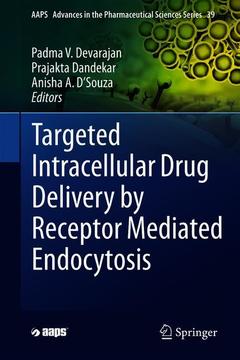Description
Targeted Intracellular Drug Delivery by Receptor Mediated Endocytosis, 1st ed. 2019
AAPS Advances in the Pharmaceutical Sciences Series, Vol. 39
Coordinators: Devarajan Padma V., Dandekar Prajakta, D'Souza Anisha A.
Language: English
Subject for Targeted Intracellular Drug Delivery by Receptor...:
Publication date: 11-2019
560 p. · 15.5x23.5 cm · Hardback
560 p. · 15.5x23.5 cm · Hardback
Description
/li>Contents
/li>Biography
/li>Comment
/li>
This book elaborates on drug delivery targeting via intracellular delivery, specifically through the Receptor Mediated Endocytosis (RME) approach, due to the involvement of cellular receptors in various grave diseases. Targeted delivery relies on two basic approaches, passive and active targeting. While passive targeting approaches have shown great promise, the improved selectivity achieved with active targeting approaches has resulted in significantly higher efficacy. Interestingly there are numerous strategies for active targeting, many of which are already highlighted in , Targeted Drug Delivery: Concepts and Applications. Nevertheless an exciting and practical strategy for active targeting, which could enable high intracellular delivery, is through exploitation of RME. Cells in the body express receptors to enable various physiological and biochemical processes. As a result, many of these receptors are overexpressed in pathological conditions, or newer receptors expressed due to defective cellular functioning. RME is based on exploitation of such receptors to achieve intracellular delivery. While targeted delivery can have manifold applications, in this book we focus on two major and challenging therapeutic areas; i) Cancer and ii) Infectious Diseases. Targeted Intracellular Drug Delivery by Receptor Medicated Endocytosis discusses the major receptors that are useful for targeted delivery for these afflictions. A major section of this book is dedicated to details regarding their occurrence and location, the recognition domain of the receptor, structure activity relationship of substrate /ligand for selective binding, ligands explored, antagonists for ligand binding and relevance of these aspects for therapy of cancer and infectious diseases. These facets are elucidated with the help of specific examples from academic research and also emphasize commercial products, wherever relevant. In vitro cellular models relied onfor assessing receptor mediated cellular targeting and in vivo models depicting clinical efficacy are focused on in a separate section. Finally, we briefly discuss the regulatory and toxicity issues that may be associated specifically with the RME approach of intracellular drug delivery.
Part 1-Introduction and overview.- Intracellular Delivery in Cancer and Infectious Diseases.- Intracellular Delivery by Receptor Mediated Endocytosis.- Part 2-Receptor and Receptor Medicated Endocytosis in Cancer.- Receptors Relevant for Cancer Therapeutics.- (chapters 3-8) .- Part 3-Receptors and Receptor Medicated Endocytosis in Infectious Diseases.- Receptors Relevant for Infectious Disease Therapeutics.- (chapters 9-13).- Part 4-Common Receptors for Receptors and Receptor Mediated Endocytosis in Cancer and Infectious Diseases.- Chapters 14-17).- Receptors Relevant for Cancer and Infectious Disease Therapeutics.- Part 5-Models for Evaluation of Targeted Delivery in Cancer and infectious Diseases.- In vitro and in vivo Models for Cancer and Infectious Diseases.- In vitro and in vivo Models for Infectious Diseases.- Part 6- Regulatory and Toxicity Issues.- Regulatory and Toxicity Issues in TargetedDelivery.
Padma V. Devarajan, PhD (Tech), is Professor in Pharmacy and former Head, Department of Pharmaceutical Sciences and Technology at the Institute of Chemical Technology (ICT), Mumbai, India. Her research interests include nano carriers for targeted delivery in cancer and infectious diseases, innovative approaches in scale-up of nano drug delivery systems (DDS), bioenhancement strategies, and mucosal DDS as alternatives to parenteral administration for protein and nucleic acid delivery. She is editor of Targeted Drug Delivery-Concepts and Design, published by Springer, author of several book chapters and has publications in peer reviewed high impact journals. She is a member on the Editorial board of European Journal of Drug Metabolism and Pharmacokinetics and the Asian Journal of Pharmaceutical Sciences and peer reviewer for a number of International Journals. She has served as Board Member, Member on the Board of Scientific Advisors , Chair of the Young Scientist MentorProtégé Sub-committee of the Controlled Release Society Inc., USA and Chair- Outstanding Paper Award Committee, Drug Development and Translational research. Prof. Devarajan is a nominated Fellow of the Maharashtra Academy of Sciences, India, and recipient of number of awards including the American Association of Indian Pharmaceutical Scientists (AAiPS) Distinguished Educator and Researcher Award, and Innovation Awards for pioneering research in Nanotechnology and Targeted Drug Delivery Systems.
Prajakta Dandekar received her PhD from the Department of Pharmaceutical Sciences and Technology, Institute of Chemical Technology, Mumbai. Her doctoral research involved the development of polymeric nanoparticles for natural therapeutic agents. Later, she joined the Department of Macromolecular Organic Chemistry, University of Saarland, Saarbrucken, as a post-doctoral researcher and was involved in formulating nanoparticles of new hydrophobic starch polymers for enca
Unique in that this is the first book focused on one aspect of intracellular delivery that focuses on cancer and infectious diseases Essential advanced reference on receptor and receptor-mediated drug delivery Provides research that demonstrates high efficacy and decreased toxicity Serves as critical research for drug discovery in treating cancer and infectious diseases Each chapter includes a brief overview of the receptor and its occurence, alterations in receptor expression, recognition domain, binding of substrates to ligands, Structure activity relationship of substrate/ligand for selective binding, antagonist of ligand binding, natural and synthetic ligands, ligands in clinical development and clinical studies, targeted drug delivery strategies and conclusions and references
© 2024 LAVOISIER S.A.S.
These books may interest you

Druggable Lipid Signaling Pathways 158.24 €

Druggable Lipid Signaling Pathways 158.24 €

Vesicle Trafficking in Cancer 158.24 €

